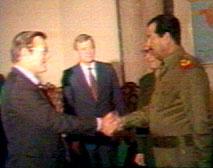
Donald Rumsfeld with Saddam Hussein December 20, 1983
Condi Comes Clean
Admits “Thousands” of Tactical Errors in Iraq
By Robert C. Keating, Editor
April 15, 2006, LOS ANGELES -- In an incredible moment made possible perhaps by jet lag and a curious chemistry between questioner and questioned, U.S. Secretary of State Condoleezza Rice did what her Commander in Chief has found so hard to do—admit to American mistakes in Iraq. Not a few mistakes, mind you, but “thousands of them, I’m sure.”
The admission occurred March 31 at Chatham House in Blackburn, England, where Rosemary Hollis, a Middle East expert, asked Rice about the lessons the U.S. had learned in Iraq. Rice said, “I know we’ve made tactical errors, thousands of them, I’m sure. But when you look back in history, what will be judged will be, did you make the right strategic decisions?”
Hollis said afterward that she would have liked to question Rice more closely about what the secretary meant by “tactical errors” and how the Bush administration planned to apply the lessons it had learned, according to John Daniszewski in the L.A. Times April 1, 2006.
One only hopes Rosemary Hollis will have the opportunity to question Rice again. For a brief moment, she functioned as truth serum for an administration that can’t handle the truth. Of course, Hollis will now be as welcome at a Condi news conference as a card counter at a Vegas casino—so we would recommend she attend her next one in disguise.
If she gets the opportunity, Hollis should follow up on Rice’s assertion that the U.S. has made the right strategic decisions in Iraq, given:
· The cost of the war heading for one to two trillion dollars—the kind of funds other countries would invest in their own future, if they had it
· The damage to U.S. reputation in the world
o invading in defiance of the world community
o torturing in defiance of Geneva Convention
· Setting the example of a pre-emptive strike for the world’s nuclear powers
· Iran’s fast ascendancy in the region post-Saddam
Did the U.S. make the right strategic decisions? White House apologists now say it could take decades before the overthrow of Saddam and its impact on the Middle East can be properly evaluated. "This is not only an evasion; it is bad historiography," writes Steve Coll in The New Yorker. "Particularly in free societies, botched or unnecessary military invasions are almost always recognized as mistakes by the public and the professional military soon after they happen, and are rarely vindicated by time. This was true of the Boer War, Suez, and the Israeli invasion of Lebanon, and it will be true of Iraq."¹

Only 23 years ago, the U.S. strategy in Iraq was to arm Saddam to the teeth for his fight against Iran…with biological, chemical and conventional weapons of mass destruction. But as the U.S. reinvents strategies, deftly switches sides, and slaps on a new label (the “war on terror”), war is war, and war never changes. War punishes the wrong people most of the time. War is more often wasteful than efficient. War is more often grim, horrible, and disgusting than noble.
War is hell, Ms. Rice. Unleashing hell is generally not “the right strategic decision.” And neither is having hell to pay.
__________________________________
¹Steve Coll, The New Yorker, April 2, 2006
© 2006 Most Corrupt.com